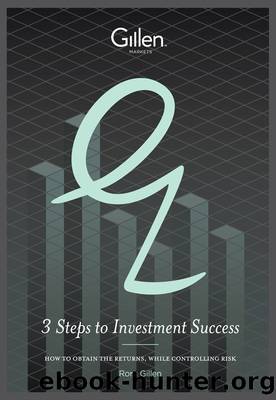3 Steps to Investment Success by Rory Gillen

Author:Rory Gillen
Language: eng
Format: epub
Publisher: Oak Tree Press
What is the counterparty risk?
What is the annual total expense ratio (TER)?
Is the dividend income paid out? If so, how often?
What are the taxation implications of selling a particular ETF/ETC?
Exchange-Traded Notes
Exchange-traded notes (ETNs) are a separate product tradable on markets but I do not cover them in detail in this book. Nonetheless, I referred to them previously and, for that reason, provide a short explanation of what they are here.
In simple terms, ETNs are securities issued by an investment bank or financial institution guaranteeing to replicate the return of a certain index return. They normally have a defined timeline, and mature and are redeemed at the end of that timeline. ETNs have no underlying portfolio and use derivatives (futures and options) to achieve their aims. ETNs are part of the financial institutionâs balance sheet and, when investors buy an ETN, they take on the credit risk of that financial institution. They can be sold short and leveraged through margin (CFD) accounts. The ETN structure allows investors to gain exposure to some sectors or strategies previously difficult to access.
INVESTMENT COMPANIES (INVESTMENT TRUSTS OR CLOSED-END FUNDS)
Just as ETFs offer an easy, low-cost and risk-controlled method of managing your savings and pension monies, so too do investment companies â known in the UK as investment trusts and in the US as closed-end funds (US). Investment companies similarly cover all the asset classes.
Investment companies are the oldest fund-type in the world, having been first used in London in the 19th century to finance the development of railroads in Latin and North America. Since then, they have grown to provide access to every asset class and most of the worldâs markets.
Like other fund-types, an investment company owns a portfolio of investments. By owning shares in an investment company, an investor in effect has part ownership of the underlying portfolio of investments owned by the fund. Whereas unlisted funds are generally governed by the financial regulator or some similar regulatory body in separate countries or regions, investment companies are governed by the Companies Act, in whatever country the company incorporates. Apart from this regulatory difference, the major practical difference is that investment companies, like ETFs, are quoted on recognised stock exchanges. Hence, investors can buy listed investment companies through a stockbroker to provide indirect exposure to most asset classes of choice and most markets of choice.
CHARACTERISTICS
Letâs look at some of the characteristics of investment companies in more detail.
Investment Companies â Active Funds Management
Investment companies tend to be actively managed by professional fund managers. In essence, an investment company acts like a fund, but trades like a share, and can make an excellent vehicle through which an investor can gain exposure to a wide spread of shares or assets (and achieve diversification, which is essential to controlling risk). It can be difficult for individuals with limited resources to achieve diversification on their own. Because it trades just like a share, an investment company can be held in a stockbroking account, like any other share. This improves the
Download
This site does not store any files on its server. We only index and link to content provided by other sites. Please contact the content providers to delete copyright contents if any and email us, we'll remove relevant links or contents immediately.
| Analysis & Strategy | Bonds |
| Commodities | Derivatives |
| Futures | Introduction |
| Mutual Funds | Online Trading |
| Options | Portfolio Management |
| Real Estate | Stocks |
Rich Dad Poor Dad by Robert T. Kiyosaki(6632)
Pioneering Portfolio Management by David F. Swensen(6300)
How To Win Friends and Influence People by Dale Carnegie(4512)
The Money Culture by Michael Lewis(4207)
The Dhandho Investor by Mohnish Pabrai(3764)
The Wisdom of Finance by Mihir Desai(3747)
Liar's Poker by Michael Lewis(3448)
Fooled by Randomness: The Hidden Role of Chance in Life and in the Markets by Nassim Nicholas Taleb(3124)
The ONE Thing by Gary Keller(3071)
Mastering Bitcoin: Programming the Open Blockchain by Andreas M. Antonopoulos(3045)
The Intelligent Investor by Benjamin Graham Jason Zweig(3041)
The Psychology of Money by Morgan Housel(3036)
Rich Dad Poor Dad: What The Rich Teach Their Kids About Money - That The Poor And Middle Class Do Not! by Robert T. Kiyosaki(2958)
Investing For Dummies by Eric Tyson(2954)
How to Day Trade for a Living: Tools, Tactics, Money Management, Discipline and Trading Psychology by Andrew Aziz(2949)
How to Win Friends and Influence People by Dale Carnegie(2915)
Market Wizards by Jack D. Schwager(2700)
How to Pay Zero Taxes, 2018 by Jeff A. Schnepper(2655)
Zero Hour by Harry S. Dent Jr. & Andrew Pancholi(2647)
